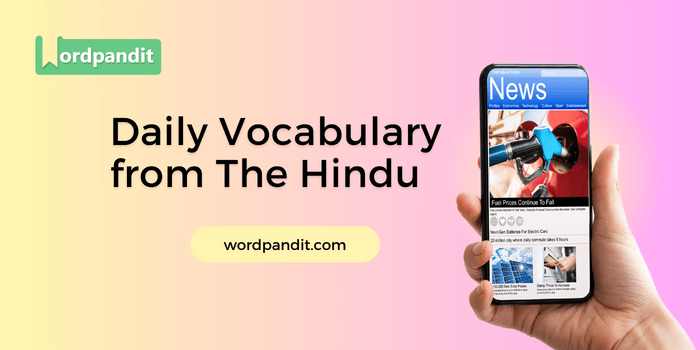Daily Vocabulary Words: List of Daily Used Words
Hi there. Welcome to this special section @ Wordpandit.
Our endeavour here is straightforward: highlighting important daily vocabulary words, you would encounter in The Hindu. This is your repository of commonly used words; essentially, we are posting a list of daily used words. Hence, this has significant practical application as it teaches you words that are commonly used in a leading publication such as The Hindu.
Visit the website daily to learn words from The Hindu.
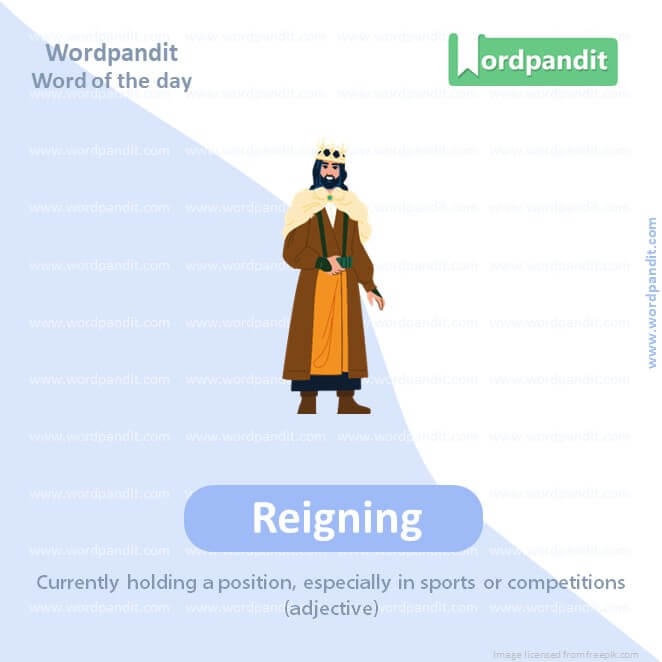
WORD-1: Reigning
CONTEXT: Vijayakant will be known for his innings when two powerful leaders were still reigning supreme in Tamil politics.
SOURCE: The Hindu
EXPLANATORY PARAGRAPH: Think about the person who wins a race and gets a gold medal. They are the best or the champion at that time. Reigning is like being that top person right now, like a king or queen in their castle.
MEANING: Currently holding a position, especially in sports or competitions (adjective).
PRONUNCIATION: RAYN-ing
SYNONYMS: Ruling, Dominant, Prevailing, Current, Champion.
USAGE EXAMPLES:
1. She is the reigning champion in women’s tennis.
2. The reigning king was loved by his people.
3. He’s the reigning expert in that field of study.
4. The team was proud of their reigning victory.
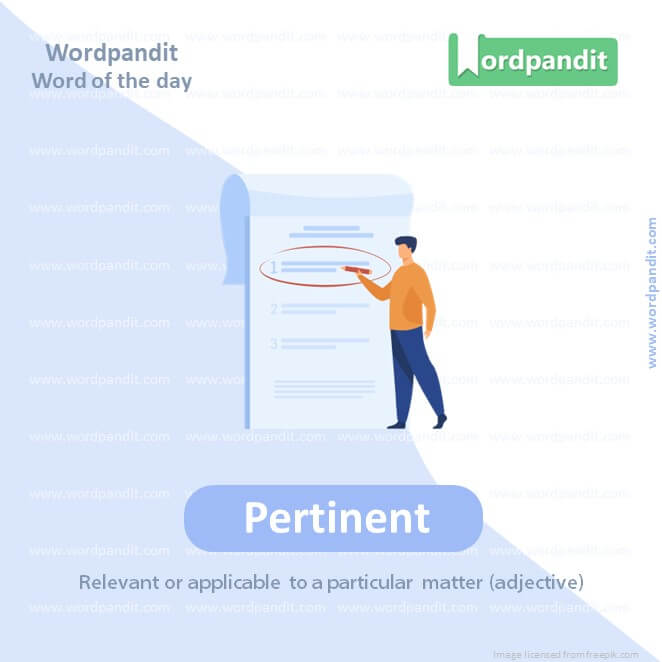
WORD-2: Pertinent
CONTEXT: A happiness-induced development model for India is highly pertinent as we are significantly governed by social relationships and cultural mandates.
SOURCE: The Hindu
EXPLANATORY PARAGRAPH: If you’re talking about animals, and someone starts talking about their favorite pizza, that’s not pertinent. Pertinent is when something is really related or important to what you are talking about.
MEANING: Relevant or applicable to a particular matter (adjective).
PRONUNCIATION: PUR-ti-nent
SYNONYMS: Relevant, Applicable, Related, Appropriate, Material.
USAGE EXAMPLES:
1. Her comments were pertinent to the discussion.
2. The book provides pertinent information on the subject.
3. It’s important to ask questions that are pertinent.
4. The article covered all the pertinent details.
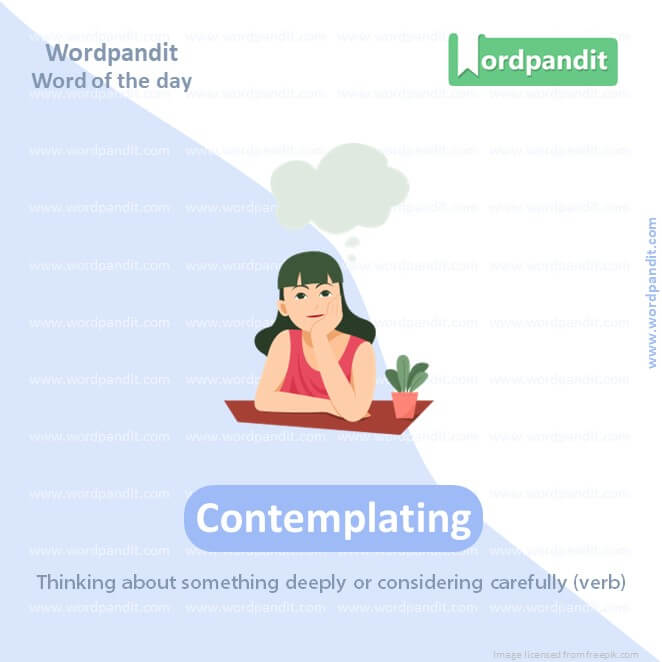
WORD-3: Contemplating
CONTEXT: He said that his government was only “contemplating” such a move and that the matter required further deliberation.
SOURCE: The Hindu
EXPLANATORY PARAGRAPH: Imagine sitting and thinking really hard about something, like what toy to play with next. Contemplating is when you think very carefully about something, sometimes for a long time.
MEANING: Thinking about something deeply or considering carefully (verb).
PRONUNCIATION: KON-tem-plate-ing
SYNONYMS: Considering, Pondering, Reflecting, Musing, Deliberating.
USAGE EXAMPLES:
1. She was contemplating her decision for the project.
2. He spent the evening contemplating his future.
3. Contemplating the meaning of life can be deep and complex.
4. They were contemplating whether to go on vacation or not.
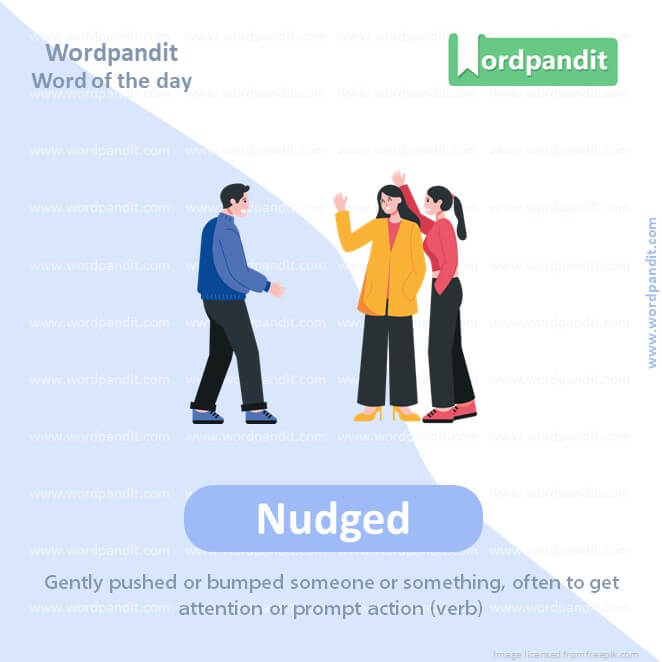
WORD-4: Nudged
CONTEXT: The grapevine is that the Chief Minister has been nudged by the leaders at the Centre not to touch the “sensitive” issue while the case is pending before the Supreme Court and especially before the Lok Sabha elections.
SOURCE: The Hindu
EXPLANATORY PARAGRAPH: Imagine you want your friend to look at something without saying it out loud. You might gently push them with your elbow. That gentle push is a nudge. Nudging is when you slightly push someone or something, often to get their attention.
MEANING: Gently pushed or bumped someone or something, often to get attention or prompt action (verb).
PRONUNCIATION: NUJD
SYNONYMS: Pushed, Prodded, Elbowed, Bumped, Poked.
USAGE EXAMPLES:
1. She nudged her friend to look at the bird.
2. He was nudged awake by his sibling.
3. The cat nudged the door open.
4. She nudged the ball with her foot.
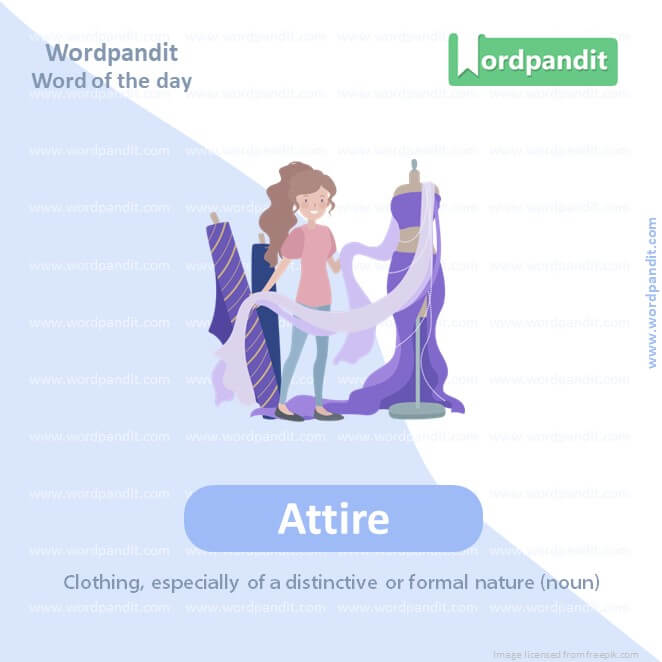
WORD-5: Attire
CONTEXT: On February 5, 2022, the then Bharatiya Janata Party (BJP) government issued an order that said that students in educational institutions should only wear prescribed uniforms, and where none is prescribed, wear “such attire that would accord with equality and integrity and would not disrupt public order.”
SOURCE: The Hindu
EXPLANATORY PARAGRAPH: Attire is just a fancy word for clothes. Like the outfit you wear to school or a costume for a party. It’s what you put on your body to look nice and to not be cold!
MEANING: Clothing, especially of a distinctive or formal nature (noun).
PRONUNCIATION: uh-TYRE
SYNONYMS: Clothing, Apparel, Outfit, Garments, Dress.
USAGE EXAMPLES:
1. The party required formal attire.
2. He admired the traditional attire of the dancers.
3. Her attire was perfect for the job interview.
4. The store specializes in wedding attire.
WORD-6: Aggrieved
CONTEXT: When you feel aggrieved, it’s like feeling that something unfair has happened to you. Like if someone took your toy without asking, you might feel hurt or upset – that’s being aggrieved.
SOURCE: The Hindu
EXPLANATORY PARAGRAPH: If you’re talking about animals, and someone starts talking about their favorite pizza, that’s not pertinent. Pertinent is when something is really related or important to what you are talking about.
MEANING: Feeling resentment or upset due to unfair treatment (adjective).
PRONUNCIATION: uh-GREEVD
SYNONYMS: Distressed, Upset, Wronged, Offended, Resentful.
USAGE EXAMPLES:
1. He felt aggrieved by the unfair decision.
2. The aggrieved party filed a complaint.
3. She expressed her aggrieved feelings.
4. The customers were aggrieved by the poor service.
WORD-7: Imperilled
CONTEXT: A whole generation of young Muslim students’ right to education has been imperilled by the hijab ban.
SOURCE: The Hindu
EXPLANATORY PARAGRAPH: Imagine walking on a very thin bridge over a river. You need to be careful because it’s dangerous and you could fall. Imperilled means being in danger or at risk of getting hurt.
MEANING: Put at risk or endangered (verb).
PRONUNCIATION: im-PAIR-uld
SYNONYMS: Endangered, Threatened, Risked, Jeopardized, Exposed.
USAGE EXAMPLES:
1. The species is imperilled due to habitat loss.
2. His actions had imperilled the mission.
3. The flood imperilled the town’s safety.
4. Their choices imperilled their health.
WORD-8: Hemmed
CONTEXT: The entire episode underlines the fact that the Congress government in Karnataka, despite winning 135 out of 224 seats, continues to be hemmed in by the ideological framework of Hindutva.
SOURCE: The Hindu
EXPLANATORY PARAGRAPH: Think about the bottom of your shirt or the end of your pants. There’s a folded and sewn part so that it doesn’t unravel. That’s called hemming. Hemmed means that edge has been folded and sewn down.
MEANING: Folded and sewn the edge of a piece of cloth (verb).
PRONUNCIATION: HEMD
SYNONYMS: Bordered, Edged, Finished, Sewn, Tucked.
USAGE EXAMPLES:
1. She hemmed the new curtains for the living room.
2. His pants were hemmed too short.
3. She learned how to hem a skirt in her sewing class.
4. The tailor hemmed the dress perfectly.
WORD-9: Appeasement
CONTEXT: The Congress appears to constantly dread the prospect of the BJP, even as a weakened political force, finding in its every move and gesture an opportunity to brand it an “anti-Hindu” party that indulges in “appeasement” politics.
SOURCE: The Hindu
EXPLANATORY PARAGRAPH: If you give your little brother your toy just so he stops crying, that’s appeasement. It’s when you do something to make someone else less angry or upset, even if it might not be the best thing to do.
MEANING: The action of pleasing or satisfying someone, often to avoid conflict or trouble (noun).
PRONUNCIATION: uh-PEEZ-ment
SYNONYMS: Pacification, Conciliation, Placation, Satisfaction, Calming.
USAGE EXAMPLES:
1. The agreement was an act of appeasement.
2. Appeasement is not always the best policy in negotiations.
3. They used gifts as a form of appeasement.
4. The appeasement strategy did not prevent the conflict.
WORD-10: Accentuates
CONTEXT: What accentuates this is also the lack of ideological clarity on the part of Congress leaders, barring a handful, to take on the politics of Hindutva head on.
SOURCE: The Hindu
EXPLANATORY PARAGRAPH: Imagine wearing a bright red hat with your all-black outfit. The red hat makes your outfit look even more special. Accentuates means making something more noticeable or prominent.
MEANING: Emphasizes or makes more noticeable (verb).
PRONUNCIATION: ak-SEN-chew-ates
SYNONYMS: Highlights, Emphasizes, Underlines, Enhances, Intensifies.
USAGE EXAMPLES:
1. The lighting in the room accentuates the colors of the painting.
2. Her hairstyle accentuates her facial features.
3. The article accentuates the need for environmental protection.
4. The design accentuates the room’s modern look.
Vocabulary
Language is a confluence of thoughts, emotions, and experiences that find vibrant expression through words. In this spectrum, ‘vocabulary’ shines as a critical aspect that shapes and directs our language proficiency. It offers depth, nuance, and clarity to our expressions. However, mastering ‘vocabulary’ is an art that requires a strategized approach.
An intensive strategy for learning ‘vocabulary’ goes beyond the limiting precincts of memorization. Instead, it nudges learners towards comprehension and application. To understand ‘vocabulary’, take a step forward from traditional textbooks and classroom sessions, and embrace the vast world of books, articles, podcasts or digital content in the language you are learning. This step allows you to understand words in context, see how they are used in different situations, and absorb words as part of the natural flow of language.
As you journey through ‘vocabulary’, remember that this expedition should not be a race. Rather, it’s a marathon where pacing yourself is pivotal to long-term success. Learning a few words each day and consolidating your knowledge through regular revision tends to be more effective, as it prevents cognitive overload and promotes solid retention.
Interactive learning tools can provide valuable support in assimilating ‘vocabulary’. Use of flashcards, language-learning apps, or memory-enhancing software can make this process more engaging and effective, reinforcing the ‘vocabulary’ in your memory.
Lastly, practice is an incontrovertible part of mastering ‘vocabulary’. Utilize the learnt vocabulary in your daily conversations, write-ups, or presentations to ensure an active application. Doing this fosters recall and cements understanding.
In summation, learning ‘vocabulary’ is a journey that should be embraced with an integrated approach, where understanding and application are the key elements. By engaging with diverse learning resources, pacing the learning process, employing interactive learning tools, and practicing regularly, the journey of mastering ‘vocabulary’ becomes a fulfilling and enriching experience.

